“When your number’s up, why fight it, right? And if it’s not, why worry about it?”
Fate and faith. That line quoted above is delivered with a kind of petrifying calm by Rod Taylor’s flyer during one of the many times he and his maker passed within a hair’s breadth of one another in Fate Is the Hunter (1964). He is by his words and by his actions a fatalist, believing that most of what happens in life, the larger scale concepts at any rate, are beyond one’s control. It’s part of his attraction, lending a devil may care aspect to him that draws people when it’s carried off with aplomb. And then there is faith, such an important and defining principle in the human condition. One may or may not subscribe to the former, but the latter (and not necessarily in a religious sense) surely touches all of us and influences our approach to life. Both of these ideas are explored in Ralph Nelson’s movie, where the trappings of the genre picture – in this case the aviation thriller/disaster movie – are used to frame a fairly simple tale of one man’s belief in the character of his friend and, consequently, in his own judgement.
There is a lengthy prologue, the routine preparations for a transnational flight filling up most of the time and introducing three main characters – pilot Jack Savage (Rod Taylor), his friend airline executive Sam McBane (Glenn Ford), and stewardess Martha Webster (Susanne Pleshette). So yes, all fairly routine, until it’s not. A fault in an engine, then a communications glitch, and then the other engine fails. And then the crash. Of those on board only the stewardess survives and it falls to McBane to sift through the little evidence available in order to fix the cause of the disaster. The airline seems keen to put pilot error on the part of Savage forward as the reason, and the air of raffish irresponsibility he spent his life cultivating backs up this approach. However, McBane is unconvinced, partly due to a sense of self preservation as his championing of Savage over the years has left his own acuity at least on the periphery of suspicion, but perhaps more importantly he balks at the notion his friend was so careless as to be the one solely responsible. In his efforts to see beyond the easy way out, he finds himself delving into the past, the past of Savage to be exact, trying to clear the man and in a way trying to clear his own conscience, to validate his faith in a friend and in himself.
Anyone going into this movie with the expectation of seeing a thriller of some kind is likely to be disappointed. There is the tense build up to the crash in the prologue, and a pretty suspenseful reconstruction undertaken right at the end, but that’s about it in terms of standard thrills. The rest of the movie, the bulk of the narrative, is a character study, an examination of who Savage was and why he acted as he did, largely told by means of multiple flashbacks, each one colored somewhat by the sensibilities of the person doing the telling but also by the spirit of the man himself. By the end, we have gained a broader perspective on this ebullient fatalist, the views of those touched most deeply by their contact with him having reshaped this both subtly and decidedly. The net result is that the truth is arrived at by a combination of chance and logic that is apt under the circumstances, and on a deeper level McBane feels vindicated not only since he has salvaged the reputation of his friend but because in so doing he has reaffirmed the primacy of faith.
Ralph Nelson had a spotty, patchy kind of career, veering wildly from genre to genre and hard to pin down stylistically. Fate Is the Hunter was a memoir penned by aviator Ernest K Gann, the stories contained in that book have given rise to a number of movies but this particular film just borrows the title. Maybe Gann himself was unhappy about the result but the movie is attractively shot by Milton Krasner, has a score by Jerry Goldsmith which manages to be both haunting and lush, and is thematically consistent in a way that is satisfying.
Ford plays it low-key for the most part, a quiet performance that suggests maturity and fits his character. Taylor could be big and showy on occasion all through his career, but he too had a quietness, an introspective side that he was able to tap into and it serves him well at a few key moments. The piecing together of the various facets of a man’s life and character through the vignettes presented in the flashbacks allows a succession of performers to drop in and sketch a few more lines in the emerging portrait of Savage. Mark Stevens’ noir heyday had passed yet he brings a fine sense of weary dissipation to the role of an alcoholic former buddy who owes much to Savage. Dorothy Malone gushes glamorously as a socialite ex-fiancée in a brief interlude, while Nancy Kwan (The World of Suzie Wong) has a slightly more substantial part and consequently adds a good deal more to our understanding of the pilot. Susanne Pleshette, on a good run around this time and only a year after co-starring with Taylor in Hitchcock’s The Birds, brings a touching bewilderment to it all, wondering why she should have been singled out to live when everyone else perished. She was an actress who always had a gutsiness about her and that aspect is on show when she has to confront her fears and thus make perhaps the vital contribution to the final resolution.
Fate Is the Hunter is the kind of film that isn’t quite what it seems to be on the surface. There is aviation drama to satisfy those drawn to the title by that aspect but that’s only incidental I’d say. At heart, the movie is about perceptions and assumptions, how chance and belief can combine to shape a life, how one’s impressions and suppositions may not be as dependable as we hope, and how reason can transcend the random while also bolstering faith and friendship.
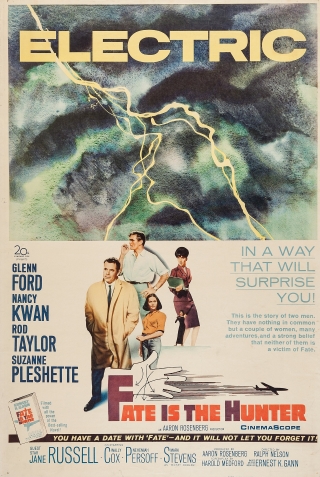
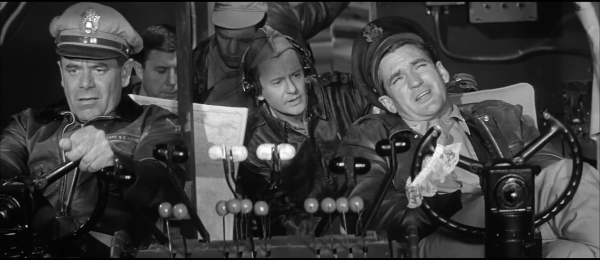
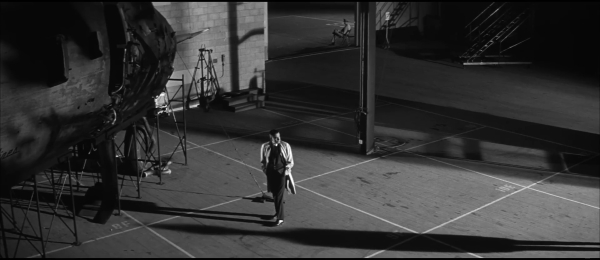
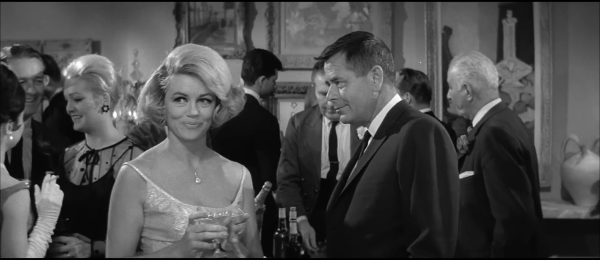
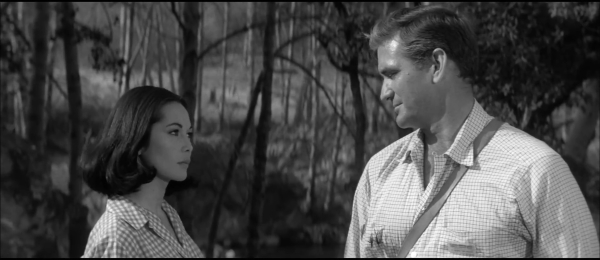

great review, Colin. I like this film a lot. As you say, a character study. I wonder if Glenn Ford realised Rod Taylor had the starrier role. The ending, where the crash is reconstructed , was nail biting!
LikeLiked by 1 person
If one is sharp enough, I guess the reason behind it all is telegraphed in the initial stages, but I fully agree that the reconstruction winds the suspense tight and works really well.
Taylor definitely had the more glamorous part, which Ford must have been aware of. However, Ford’s role is a quietly effective one and a good fit at that stage in his career.
LikeLike
A top-notch review of this fine movie, Colin. I’ve always liked the film but now will watch it again to focus on some of the elements you have mentioned, particularly the performances by Ford and Taylor. The more films of his I’ve watched, the more I have come to appreciate Ford’s talent. On first viewing, I thought his acting in 3.10 TO YUMA was just too avuncular to see why anyone would fear his character. Subsequent viewings showed that, beneath the surface, he was quietly conveying cold menace. I might say that Gann’s memoir, whose title the movie used, is one of the finest books on flying ever written.
LikeLike
Gann’s writing has been pretty well represented on screen, which says something in itself.
Ford was a deceptive performer, doing a lot when it looked as though he wasn’t. I’ve enjoyed going back to his films lately and seeing how he handled himself in a variety of roles.
LikeLike
Another movie I clearly need to see. It’s on Blu-Ray. It seems like I have a choice between the Twilight Time Blu which would cost me just over $500 or the Spanish Blu which would cost me $30. I think I’ll be going for the Spanish release!
I seem to be buying a lot of Spanish Blu-Rays recently. And they’ve been excellent.
LikeLike
I always go for the option that is easiest on my wallet. Mind you, the old DVD was quite acceptable. Anyway, it’s a fine movie and worth seeing.
LikeLiked by 1 person
I’ve ordered my copy.
LikeLike
I hope you enjoy it when it gets to you.
LikeLike
The only Ralph Nelson movie I can recall seeing is Father Goose, and that was so long I remember nothing about it. Are there any of his other movies that are worth tracking down?
LikeLike
Requiem for a Heavyweight is pretty good. Duel at Diablo has its moments. Soldier Blue is not an easy watch in places.
LikeLiked by 1 person
Rod Taylor doesn’t get a huge amount of respect as an actor. I thought his performance was in Dark of the Sun.
LikeLike
Obviously that should have read “this best performance” – one day I’ll learn to double-check things before hitting Send.
LikeLike
Yes, a good tough movie that’s well directed by Jack Cardiff.
Taylor had some good parts in 36 Hours, The V.I.P.s, The Birds of course.
LikeLike
I don’t think I’ve ever seen The V.I.P.s even though I have a copy on DVD. Should I see it?
LikeLike
I like it a lot. Next to Separate Tables, it’s the best Terence Rattigan adaptation. And I also think it’s the best Burton / Taylor collaboration.
LikeLike
Another interesting Taylor performance is ‘Young Cassidy’ a part John Ford film. Taylor has some hilarious stories about Ford in Eyman’s book on the director. Seemed like the Old Man liked him.
LikeLike
Chris, that’s one of a handful of (available) Ford movies I have not yet had a chance to catch up with.
LikeLike
On the subject of Burton / Taylor collaborations, I’m rather fond of The Comedians. I know a lot of people don’t like that movie but it works for me.
LikeLike
I rewatched it a few years ago and didn’t get on with it , I didn’t think the star couple worked well in it either. I remember liking Greene’s book and as I recall the movie isn’t that different overall so I think it’s mainly the performances that I found problematic.
LikeLike
Greene wrote the screenplay himself.
I know I’m very much in the minority in liking this movie and I can’t really explain why I like it so much. All I can say is that it has a certain atmosphere, a certain tone, that appeals to me but leaves everyone else cold. I do think the tone of the movie is slightly odd.
LikeLike
That’s fair enough, everybody reacts in a different way.
I know I first saw that movie many years ago (30 to 40 I’d say) and it was under what I wouldn’t term optimal conditions – late night TV screening where I was in an out of the room and caught only bits an pieces of it. When I finally had the chance to view it again properly none of it gelled for me.
LikeLike
This is making me want to watch my TCM Burton/Taylor set again.
LikeLike
I might give The V.I.P.s a spin again sometime soon myself actually.
LikeLike
Colin, what do you think of the infamous ‘Cleopatra’ with the two of them? Plus, ‘Virginia Woolf? Both have rather magnificent Blus which really put them in context and have great a/v qualities.
LikeLike
It’s been a while for both. I know I found Virginia Woolf raw, effectively so at times, but a bitter and dispiriting experience all told. I should maybe see how I react now though.
Cleopatra is very good in places, the sweep and scale can’t fail too impress. Still, it’s too much for me taken as a whole.
LikeLike
Yes, that seems right for them.
LikeLike
I really disliked Virginia Woolf. Stagey and miserable and nasty. A movie for film critics. They love misery.
I thought Taylor was good in Cleopatra but just not as good as Claudette Colbert. The 1934 DeMille version is superior in every way. DeMille knew how to do that sort of thing. Mankiewicz didn’t have a clue.
LikeLiked by 1 person
On the subject of Burton-Taylor collaborations no-one ever mentions the fascinating low-budget Doctor Faustus (co-directed by Burton). Shakespeare has had plenty of his plays adapted for films but poor Christopher Marlowe has been largely ignored.
When people do mention this movie it’s usually in scathing terms, as an example of a Burton-Taylor ego trip. It’s actually a strange fascinating film if you’re in the right mood. It’s very 60s. Kit Marlowe might have enjoyed it had he travelled in time to 1967 and dropped some acid. I actually enjoyed this one, but you do have to be in the right mood. It’s rather trippy and groovy and far out man.
LikeLike
We can hardly talk about Burton-Taylor collaborations with mentioning Boom! A great movie if you enjoy watching train wrecks, air crashes and car accidents.
You have to wonder what kinds of mind-altering substances Joseph Losey was ingesting at the time.
Still, Boom! does have its own morbid fascination.
LikeLike
I have never seen it and it seems to have been widely panned. The behind the scenes difficulties – bronchitis and a thieving monkey – can’t have helped I suppose. I may catch up with it at some point though – Tennessee Williams adaptations (and there were a good number of them through the 50s and 60s) have been a very mixed bag overall.
LikeLike
Boom! is worth seeing because until you see it you won’t believe it. You might end up suspecting that that monkey had a hand in directing the picture.
I agree about Tennessee Williams adaptations. They tend to be very very stagey and I think the excessive staginess is inherent in the source material. There was an obsession with adapting his plays but they’re very anti-cinematic.
LikeLike
I know it’s not Burton/Taylor but it is Brando/Taylor and from the same period but ‘Reflections in a Golden Eye’ is a must see. The golden tinged version. Accept no substitutes. John Huston directing, Julie Harris and her back story with shears, the only sane person on base Brian Keith, Liz’s body double, Brando muttering and sputtering, and Robert Forster riding a horse naked. This is crazy stuff. Is it ‘Boom’ crazy? Well viewer must decide. I admit I’m fascinated.
LikeLike
Been a while since I saw this one 🙂 A rewatch is in order 🙂
LikeLike
It’s worth a revisit, John. Good solid storytelling and an appealing central message.
LikeLiked by 1 person
Suzanne Pleshette was one of those actresses who didn’t have the success in films that one might have expected. Although she did do pretty well on television.
In fact I can’t really think of any other significant film roles that I’ve seen her in.
The 60s/70s was not a good era for actresses in Hollywood.
LikeLike
I don’t think much of that philosophy at all. We work and fight wars to survive, we do not cave to catastrophes, of any sort. Bad luck may beat us, but not always.
LikeLike
I wouldn’t say she did too badly. Aside from this movie, she had leading or prominent roles a pair of movies for Delmer Daves in Rome Adventure and Youngblood Hawke, then there was The Birds, A Distant Trumpet for Walsh, A Rage to Live, Nevada Smith. Later of course she had that long run on The Bob Newhart Show on TV.
LikeLike
Dear Colin……Please forgive hi-jack 🙂
Paging Barry Lane
Dear Barry I saw your comment on the old thread at Laura’s and thought this is the best place to track you down.
I did not compare PRC and Monogram to Republic it’s just that it’s rare to see quality releases by all 3 of these studios and I jump on them whenever they appear. I agree Republic was a minor major and the talent roster that you mentioned bears this out. Certain talents liked to be a big fish in a small pond working for Republic as opposed to Warner Bros for instance Joan Leslie for instance. Unhappy with her roles at Warners Leslie chose to work for the likes of Eagle Lion,Republic and Lippert and made some pretty decent movies for those smaller studios REPEAT PERFORMANCE and WOMAN THEY ALMOST LYNCHED to name but two. I enjoyed her role in the Eagle Lion Western NORTHWEST STAMPEDE where James Craig tells Leslie “this country is no place for a woman” when she snuggles up with Flash the dog under the only blanket leaving Craig shivering through the night.
As far as George Brent’s Republic titles ANGEL ON THE AMAZON is a minor classic and highly recommended. Most Republic B Movies had better production values than those Monogram or PRC made and yes it annoys me when people call Republ8ic a Poverty Row studio. It’s very rare to find a decent vintage Republic title in the digital underground but they do exist Jacques Toueneur’s excellent DOCTOR’S DON’T TELL for instance. Other much desired titles like OUT OF THE STORM are impossible to find in decent quality but I prevail. On the excellent Noir blog “Where Danger Lives” there is a most impressive gallery of Republic Noir titles most on the missing list sadly.
Most of my “most wanted” titles are either from Monogram PRC or in particular Republic.. Australia’s Imprint and Kino Lorber do release the odd Republic title and Kino should certainly include more Republic titles in their Noir sets. Not all Monogram titles are poverty row either their two King Brothers Belita pictures had million dollar budgets.
Colin-
I cannot remember much about FATE IS THE HUNTER except it had a cameo by Mark Stevens looking somewhat aged-the support feature in the UK was APACHE RIFLES.
LikeLiked by 1 person
It is always good to hear from you, John. Agreed across the board.
LikeLiked by 1 person